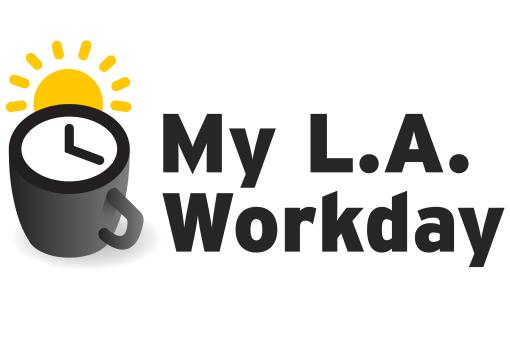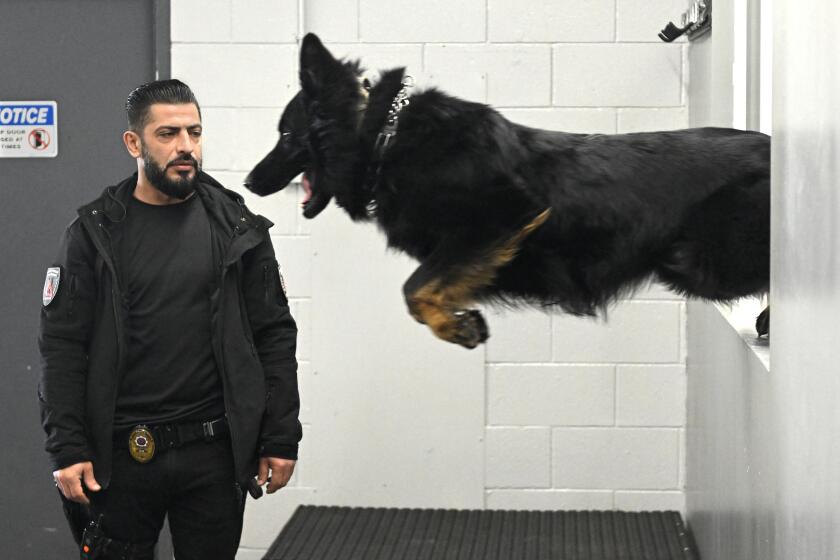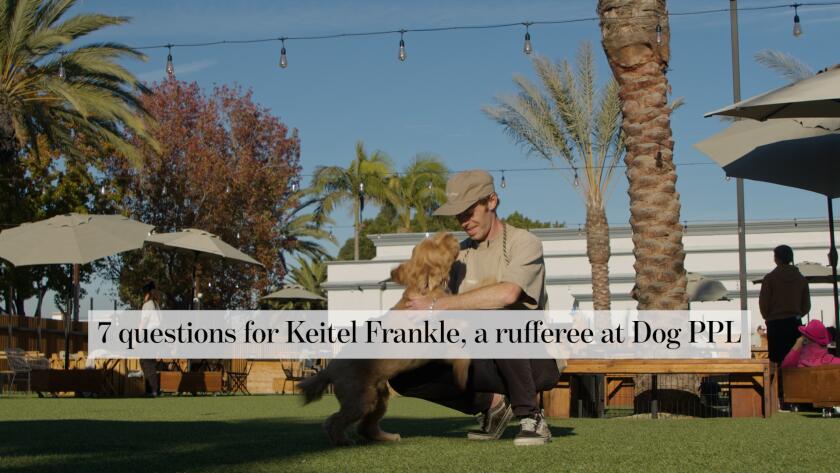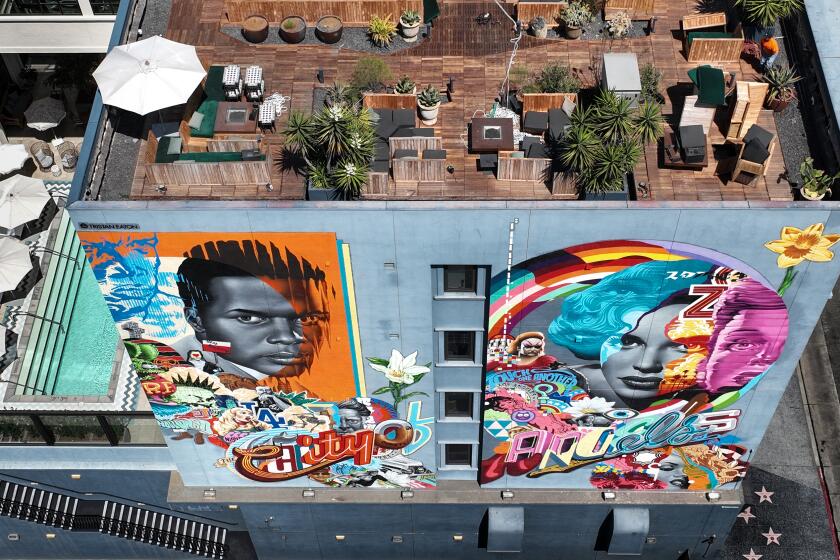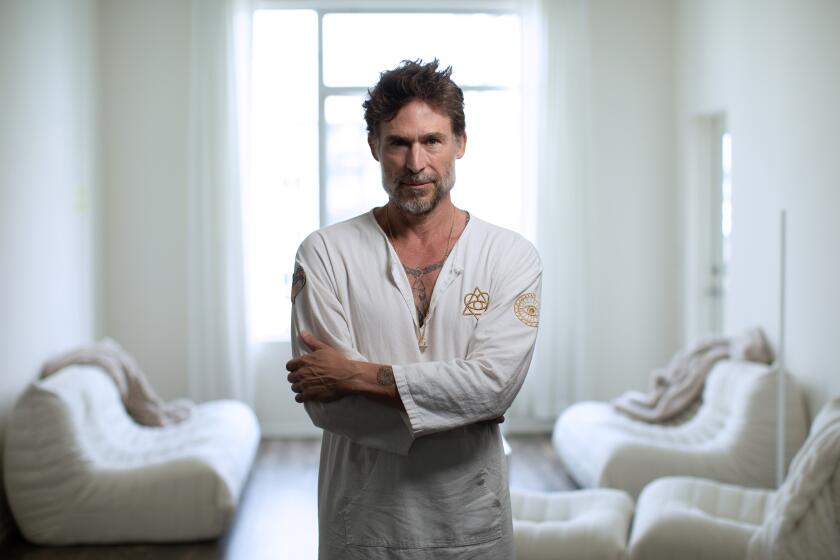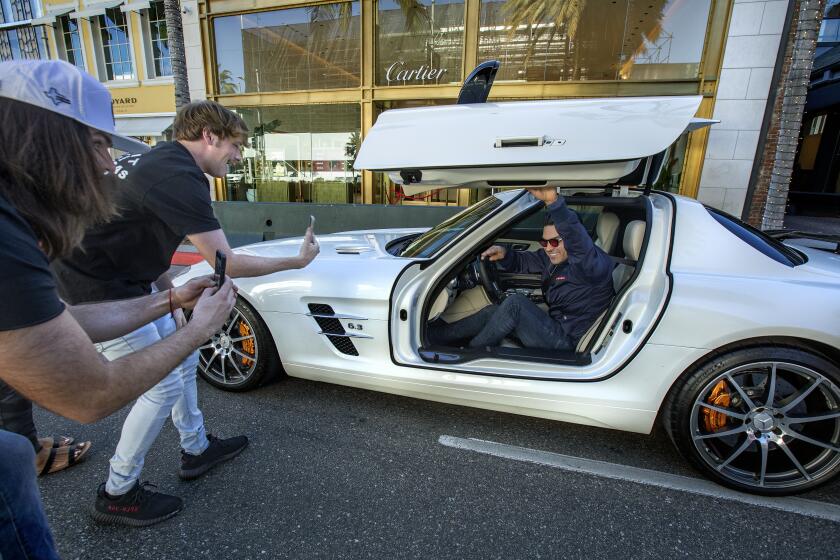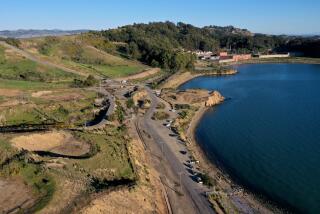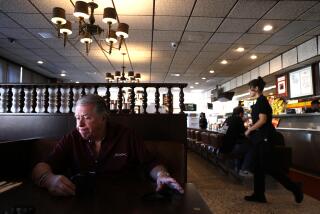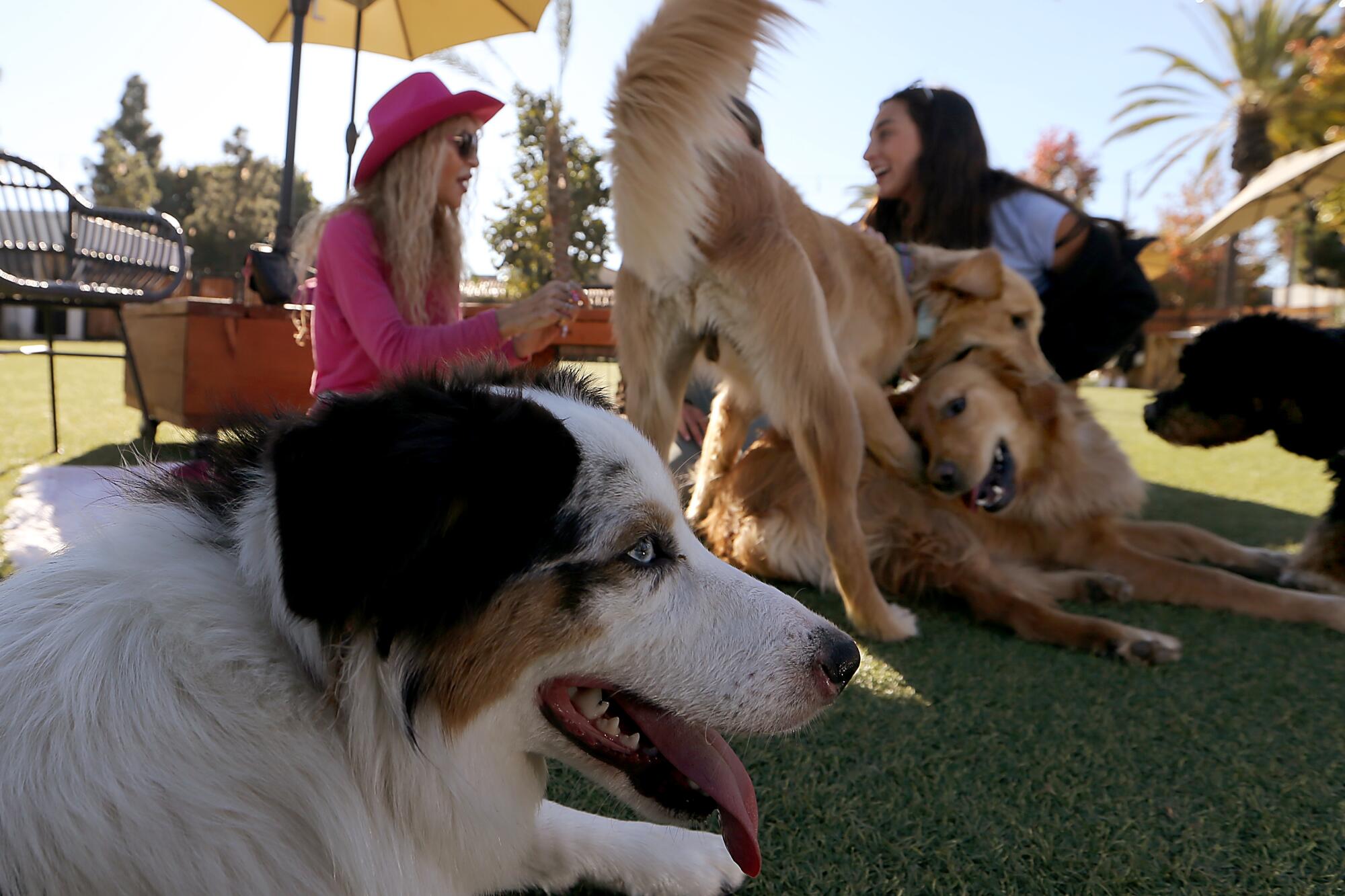
Elite social clubs have long been private playgrounds for the well-groomed, but one in Santa Monica has officially gone to the dogs.
At Dog PPL, a members-only dog park that costs $120 a month, pre-screened pets get a safe and clean place to play while their humans enjoy the perks typical of modern private clubs: a cafe, bar and concierge; free Wi-Fi and validated parking; lounge areas and work spaces; and a robust calendar of events.
“It’s the Soho House for dogs, except much cooler,” 26-year-old Kati Rosenthal, a student from Brentwood who joined last year, said while hanging out at the park on a recent Tuesday afternoon. “Here they vet the dogs — no one judges you.”
“It’s very exclusive in a good way,” Ashley Kaye, 22, said. The two met at Dog PPL when their lookalike golden retrievers, Bailey and Rooney, took a liking to each other; now canine-duo and human-duo are practically inseparable.
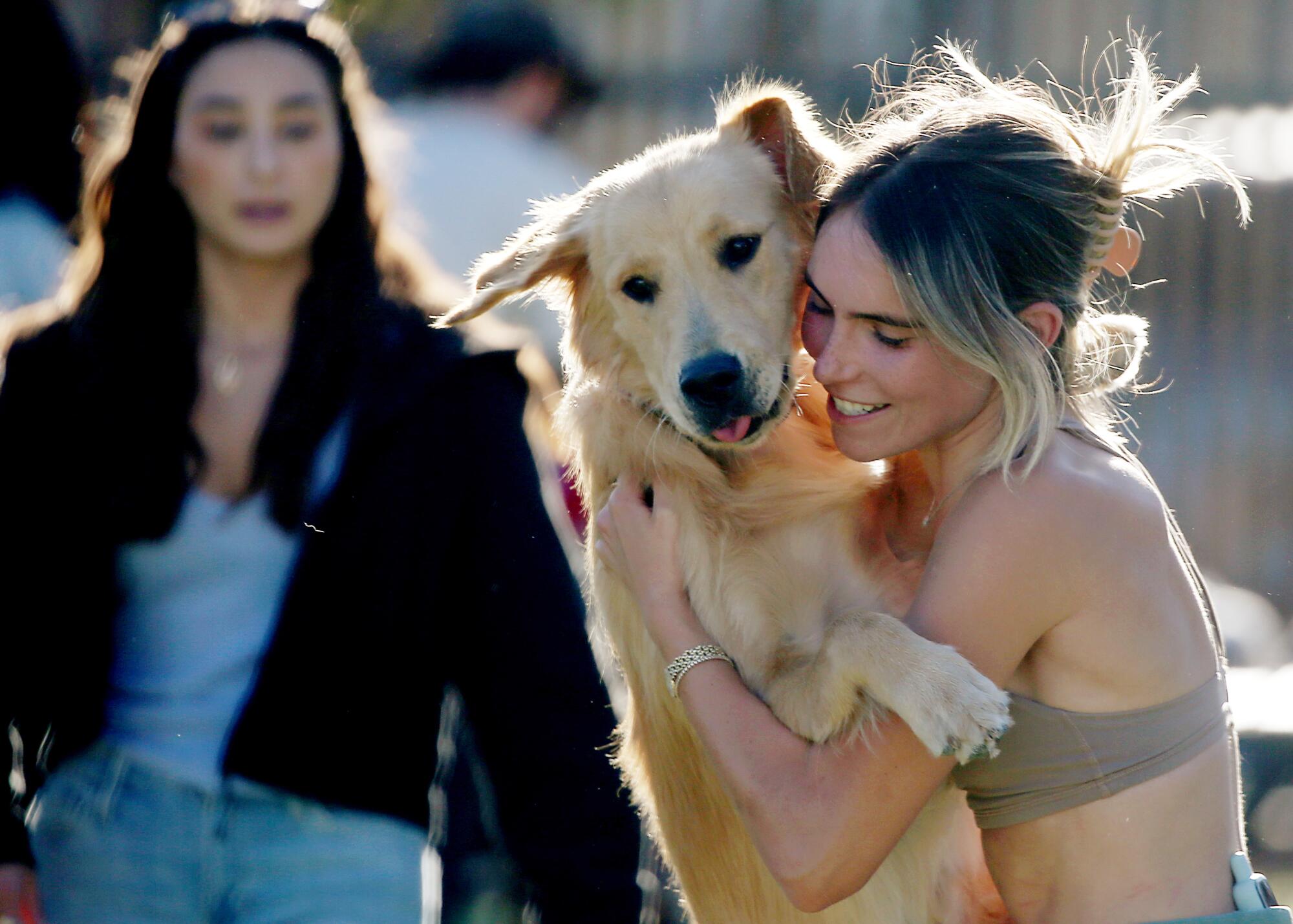
“We come twice a day — we don’t have jobs,” Kaye said as she pulled 9-month-old Rooney onto her lap. She’d arrived straight from yoga class in her Lululemon sports bra and leggings and was relaxing with a beer in the middle of the immaculate turfed lawn. “I’ve brought dates here. My friends, when they’re anxious, will come and just sit on the floor and love it up.”
Private dog parks are in high demand as affluent city dwellers seek elusive green spaces for their pets to socialize and roam off-leash. At the same time, luxurious members-only clubs have flourished as the pandemic has waned; like Dog PPL, many of the newer ones are tailored for niche groups such as fitness fanatics and creative types, or specific purposes such as co-working.
BUSINESS
What do you do for work?
That’s the question My L.A. Workday answers. The series takes you inside a day on the job with some of the city’s most fascinating people. Interviews are edited for length and clarity.
Dog PPL has grown to 1,700 members in the two years since it opened. Nearly two-thirds are women and the average household income is $143,622, co-founder Alexander Esguerra said.
Now the company has ambitious plans to expand, starting with up to three new Southern California locations next year.
“Our goal is to open 60 locations in the next four years in the country,” Esguerra said, “and then onward globally.”
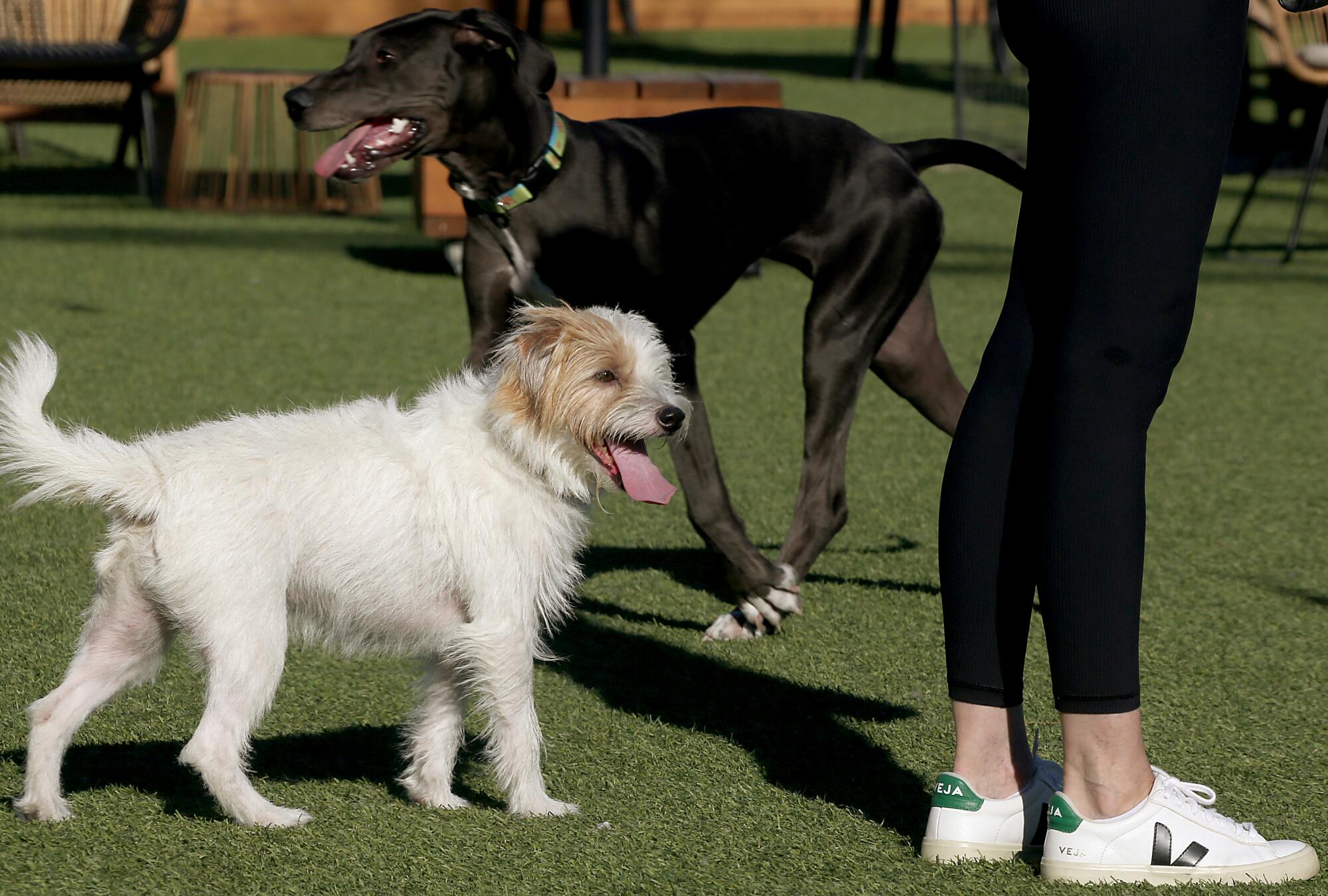
To join Dog PPL, dogs must pass a temperament test, be up to date on vaccinations and be spayed or neutered at 8 months of age. Once they’re approved, they have to demonstrate good behavior while at the park, and their owners are required to stay on the premises and clean up after them — this isn’t doggy day care.
Cheaper than a bodyguard, more portable than an alarm system, guard dogs costing six figures are in high demand in L.A.’s wealthier precincts.
That said, a team of trained “rufferees” is on hand to monitor the grounds, break things up if the dogs get too rowdy and, more often than they would like, scoop overlooked poop.
Keitel Frankle, 29, is lead rufferee and safety operations manager of what he calls “the dog version of Disneyland.” We tailed him on a recent work day.
1:45 p.m.
Frankle arrives at the park and changes into a tan Dog PPL shirt that says “Canine Social Club.” He drapes a slip leash over his shoulders and clips on a walkie-talkie, which he’ll use during his shift to communicate with the three other rufferees on duty.
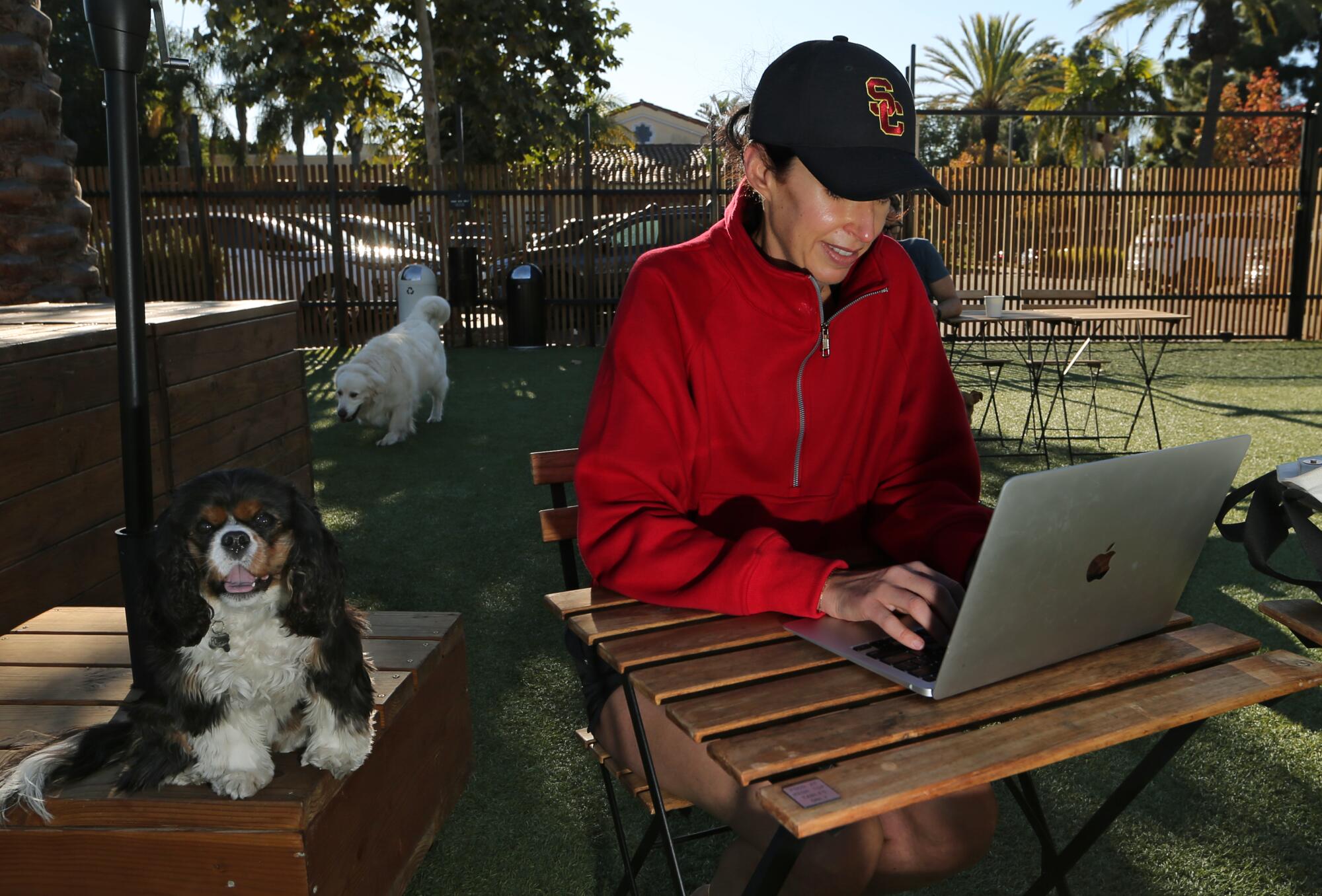
There are about 30 dogs snuffling around, the usual post-lunch lull. Many owners are working on laptops under big sun umbrellas, others are lining up at the cafe for lattes (seasonal pumpkin spice, matcha, adaptogen) and margaritas.
Dog PPL is a place of pretty people and even prettier pups, and today’s purebred parade includes a Saint Bernard, two Great Danes, a Bernese mountain dog, too many French bulldogs and corgis to count, and what feels like every fancy doodle combination imaginable.

Subscribers get exclusive access to this story
We’re offering L.A. Times subscribers special access to our best journalism. Thank you for your support.
Explore more Subscriber Exclusive content.
This being the Westside, it can sometimes feel like owners selected a certain breed “to complete the outfit,” says Frankle, who has been with Dog PPL since its opening and knows nearly all the dogs by name.
Dog PPL employs 14 rufferees, including one who is an aspiring actor and improv comic and others who work as dog trainers and veterinary assistants on the side. But this is Frankle’s full-time job, and he’s here five days a week.
2 p.m.
For the next six hours, the bulk of Frankle’s time will be spent traversing the 22,500-square-foot park — he once clocked more than 10 miles during a particularly busy day — while keeping a careful eye on the steady stream of dogs that will visit the park before closing.
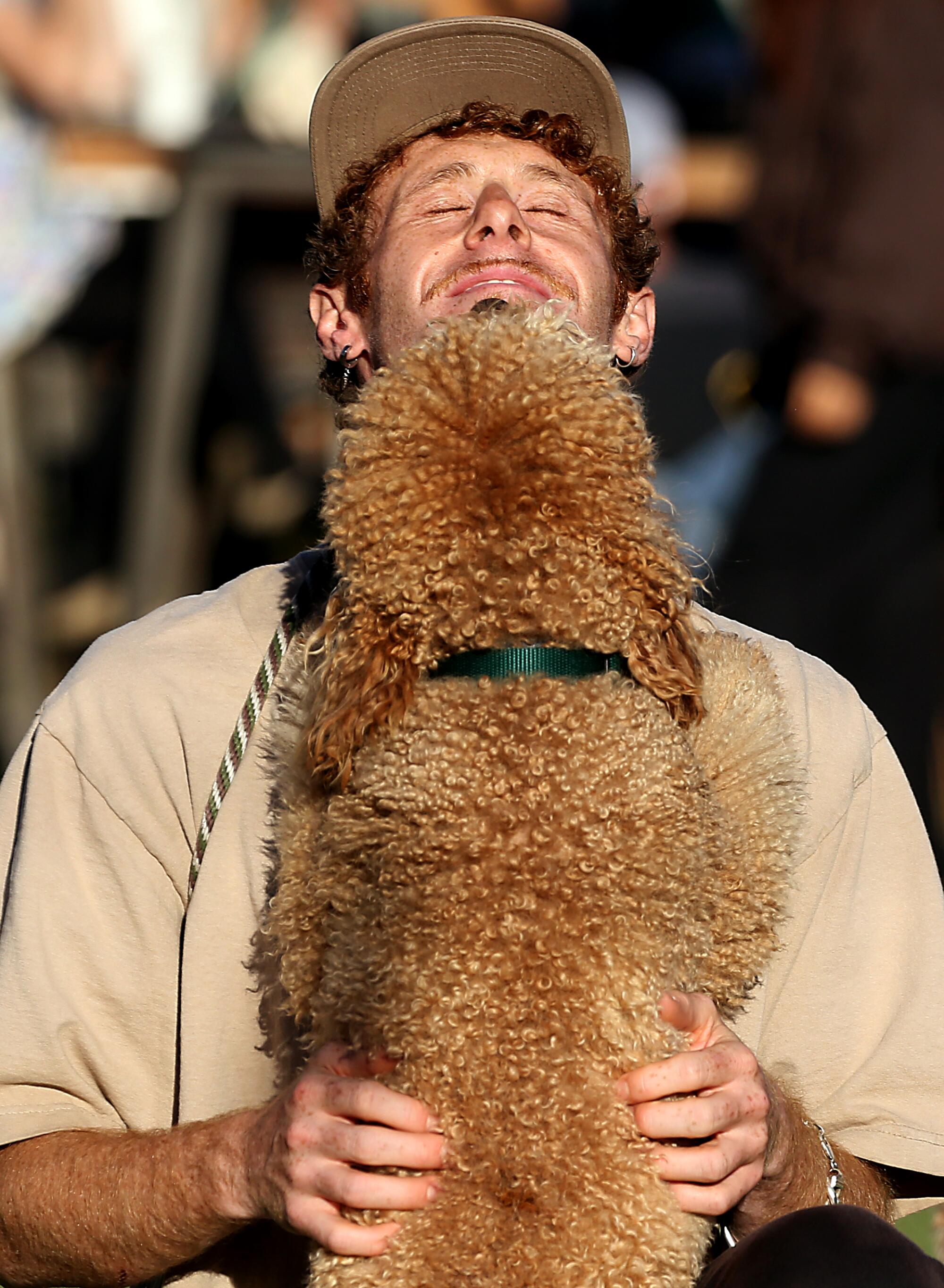
When play gets too rough — if he sees one dog mounting another or any sort of ganging-up behavior — he’ll intervene: sometimes by calling for the aggressor to stop or by physically getting in between the dogs and grabbing a collar or, as a last resort, bear-tackling one of them. The goal is to defuse the situation, although it can be tricky to determine when play veers into problematic territory.
Secretive members clubs became even more in demand during the pandemic with their promise of a full-lifestyle day-to-night experience that combines co-working and socializing under one stylish roof.
“You just want to make sure that they don’t tap too far into their instinctual behaviors, because that’s when they become predatory,” he says. “If they get too excited, a well-intentioned dog can kind of, accidentally, maybe bite too hard when they catch up.”
Yes, Frankle has been bitten multiple times — but never badly.
2:07 p.m.
Treats and toys aren’t allowed in the park to minimize “possession aggression,” but Dog PPL provides bowls of fresh water that rufferees are in charge of cleaning every three hours. (In light of the canine respiratory disease that has been spreading around the country, Dog PPL has since halted the communal water stations.)
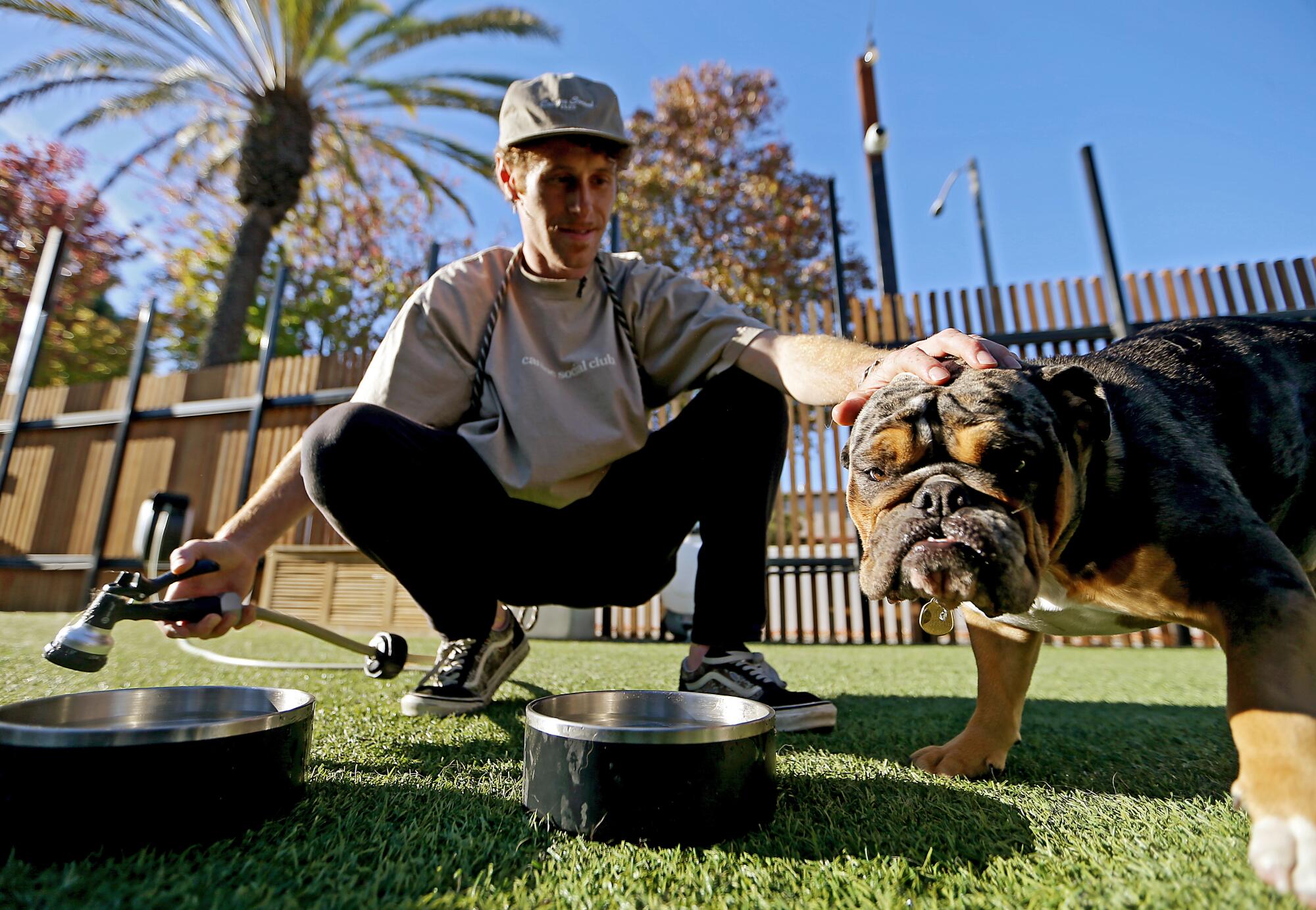
To sanitize the bowls, Frankle squirts a disinfectant solution into each one and places them inside a wooden bench to soak for five minutes out of reach of the dogs.
Tuna, a blue merle English bulldog with a pronounced underbite, ambles over to watch.
3:12 p.m.
An owner approaches sheepishly and says her dog took a runny No. 2 onto the artificial grass. Frankle dispatches one of the other rufferees to bring over a foam sprayer.
“If it’s not solid to the point where you can pick everything up — there’s a little skid mark so to speak on the turf — the pressurized backpack sprayers have an enzyme solution that eats at the proteins that are left over,” he says, a mound of thick foam now obscuring the residue. “It’s a great way to filter it through and disintegrate it at the same time.”
3:44 p.m.
Moments after separating an overexcited golden retriever puppy from a much-smaller corgi, Frankle notices a chase start to break out across the park. He takes off running, deftly intercepting the pack as they make their way around a picnic table.
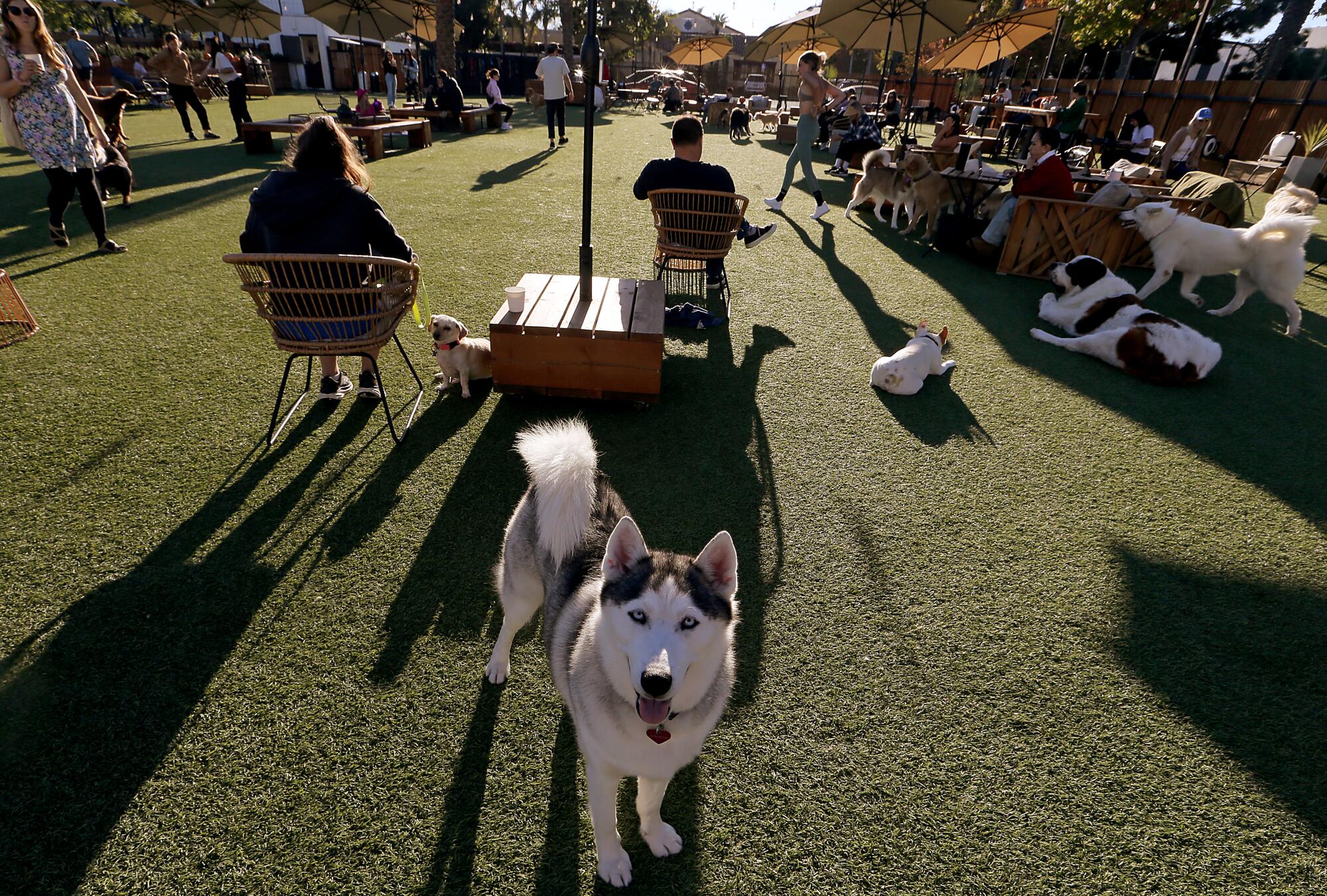
“Their four legs are a lot faster than I am and they’re able to move a lot better,” says Frankle, who owns two dogs himself. “I try to anticipate where they’re going.”
He’s always on the lookout for signs of a dog “on edge,” like yelping, tucked tails, pinned-back ears or fur standing up on its back.
4:40 p.m.
Frankle checks in with the two rufferees who had been observing a black shepherd mix during her temperament test; prospective dogs wear a yellow collar to distinguish them from the others. The dog did great, and its owner will get the good news in an email tomorrow.
Damon Lawner founded the exclusive sex club Snctm, then sold it for $1 million. At his naughty new WeHo restaurant, $10,000 gets you a booth with a velvet curtain — and no prying eyes.
“A fail is genuine aggressive tendencies — it’s super rare,” Frankle says, noting that about 95% of dogs who apply pass.
4:56 p.m.
“One of my superpowers is being able to spot poop from a distance,” Frankle says. “Like, there’s poop there, there’s poop all the way over there, I’m gonna go grab all of that. I wish I wasn’t as good at spotting poop.”
He bends over to clean up one of the piles, pulling out a roll of tan Dog PPL-branded waste bags from his pocket.
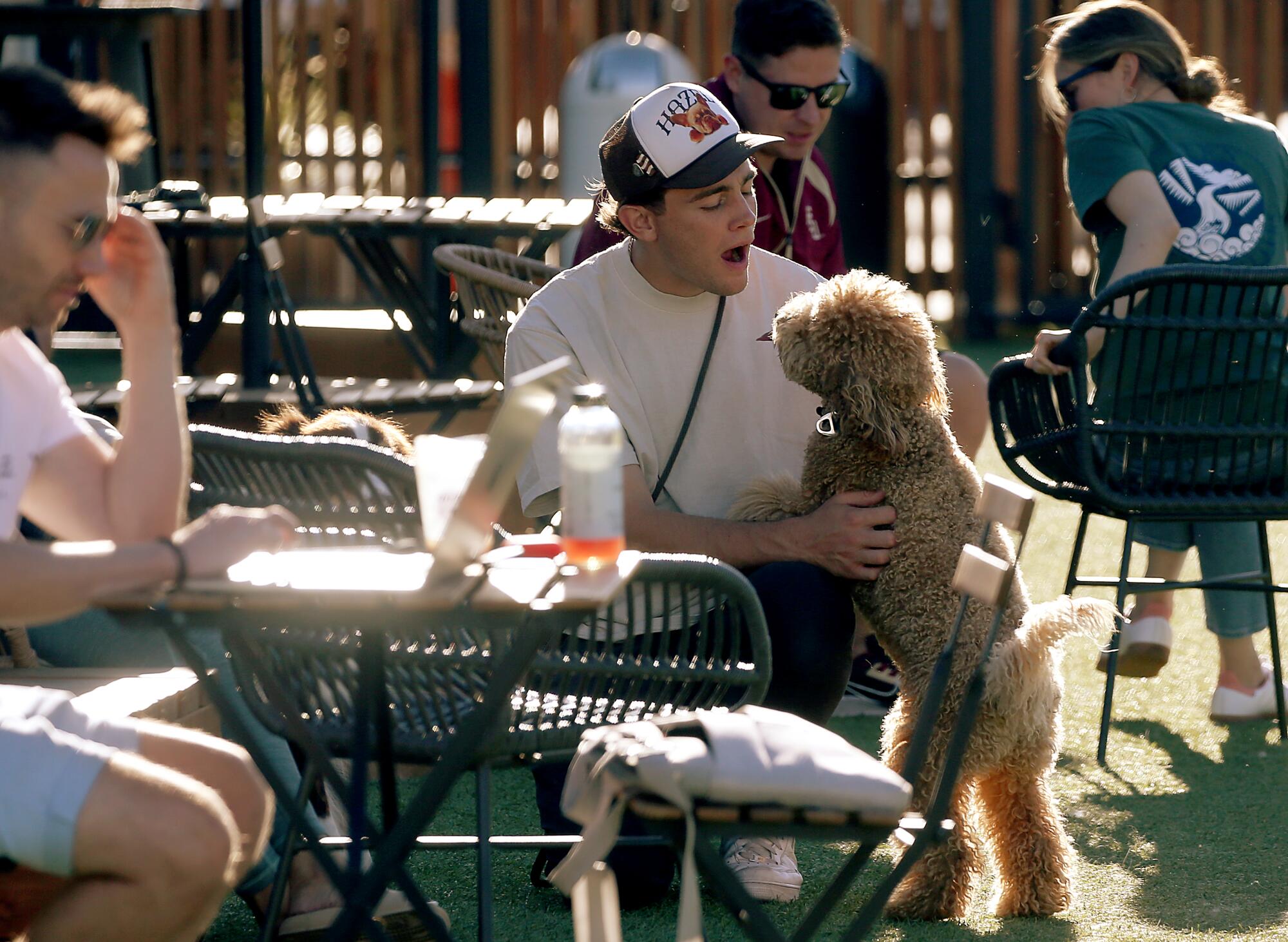
The bags are free for owners to use and placed in dispensers and in amenities baskets throughout the park, along with a soothing cream “for dry and irritated paws and noses,” leave-in conditioner fur spray and a “calm cologne” formulated to “reduce the unwanted ‘dog smell’ while moisturizing the skin and coat.”
5:50 p.m.
Tonight is monthly trivia night, one of many social events held at the park.
Members tend to arrive in droves whenever there’s special programming, be it an ugly sweater happy hour, yoga class or a holiday card photo session. A few weeks ago, Dog PPL hosted an apres-ski-themed winter wonderland extravaganza with mini mountains of real snow; over the summer, it brought in a wave pool and surfboards for dogs to ride.
Frankle rearranges tables for teams of up to six people ahead of the 6 p.m. start time, and with a few minutes to go, he reminds the co-working stragglers of Dog PPL’s no-laptops policy in the evenings.
The park is now packed — there are about 150 people and 80 dogs on the premises, and some are getting overstimulated in the high-energy environment. Frankle admonishes a dog named Milo after he catches him trying to mount another.
A viral sensation on TikTok and Instagram, Daniel Macdonald’s simple shtick has made him as rich as many of the drivers whose ultra-high-end cars he films.
“A lot of dogs — they just take it, they don’t do anything,” he says.
At that very moment, another dog assumes the position.
“Frank! Frank!!” Frankle yells at the new offender.
“Some of them, you have to tear them off of the other dog because they’re gripping on for dear life,” he says. “Mounting is something that happens every day here.”
6:30 p.m.
With trivia underway (“Number Four: Ryan Gosling is married to what actress? Number Five: What is Kendall Jenner’s tequila company called?”), things have quieted down substantially.
Frankle is observing from the back of the crowd and notices a dog loping around without a collar; he locates its owner to tell her that’s against park rules and goes to the front desk to retrieve a pink rental one.
With not much else to do at the moment, Frankle figures he’ll make himself useful: “I’m going to go pick up some poop.”
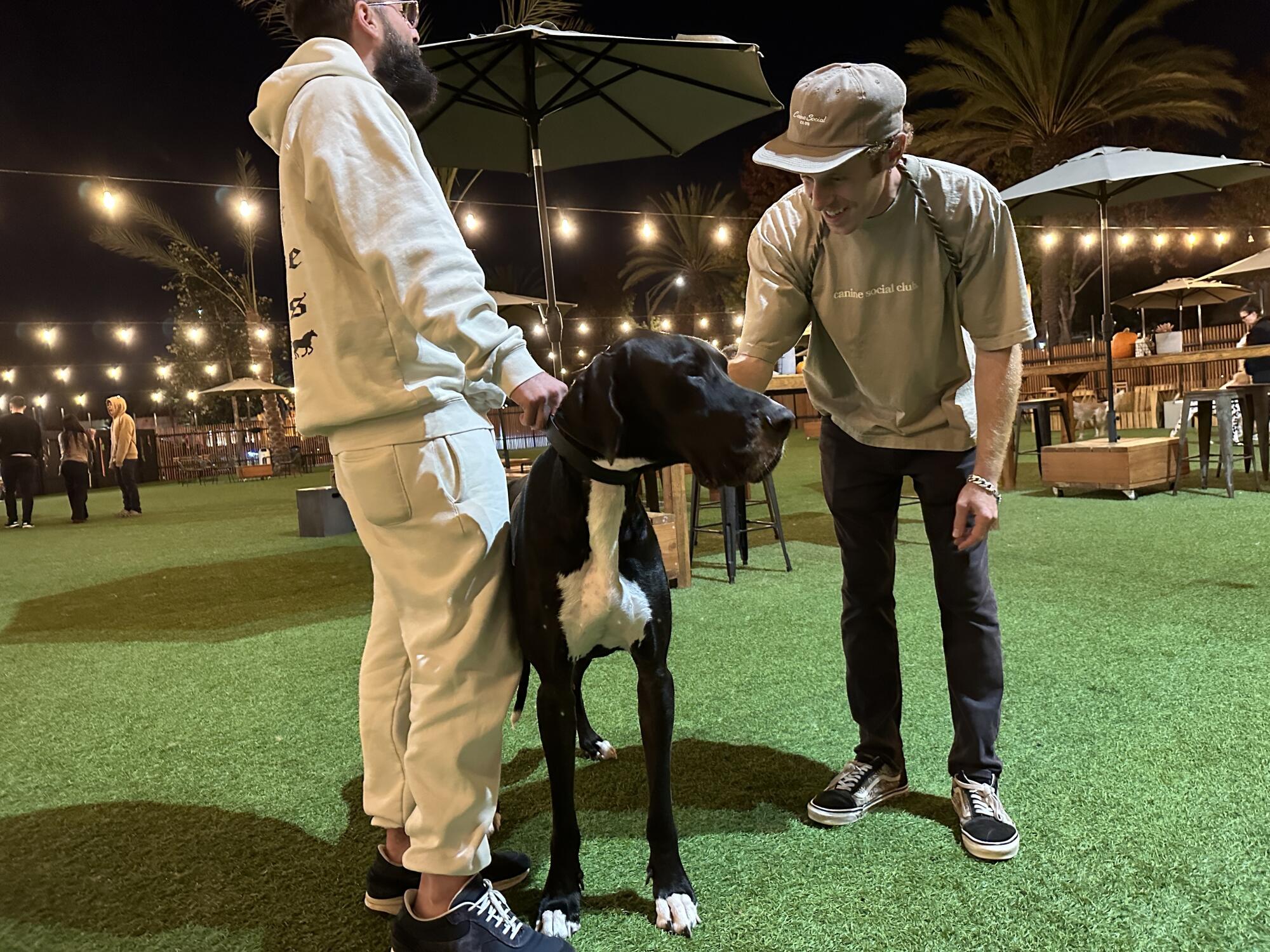
8:03 p.m.
Most of the members and their dogs have exited the park, which recorded 420 human check-ins over the course of the day and closed a few minutes ago.
Frankle is listening patiently as a member voices her displeasure over the way her dog was reprimanded by another rufferee. “It could have been more kind and tactful,” she says.
Once the park is empty, the rufferees get to work spraying down every foot of turf, a deep-cleaning process that is done three nights a week. Frankle takes the small-dog area, a fenced-off strip reserved for dogs 25 pounds and under.
Half an hour later, the turf is clean, blankets and bowls put away, lights turned off, all gates and doors locked.
“L.A. is a city of transplants, and dogs are the best icebreaker,” says Frankle, who moved to the city 11 years ago from London, where he grew up. “On my days off, I’d rather be here.”
More to Read
Subscriber Exclusive Alert
If you're an L.A. Times subscriber, you can sign up to get alerts about early or entirely exclusive content.
You may occasionally receive promotional content from the Los Angeles Times.

